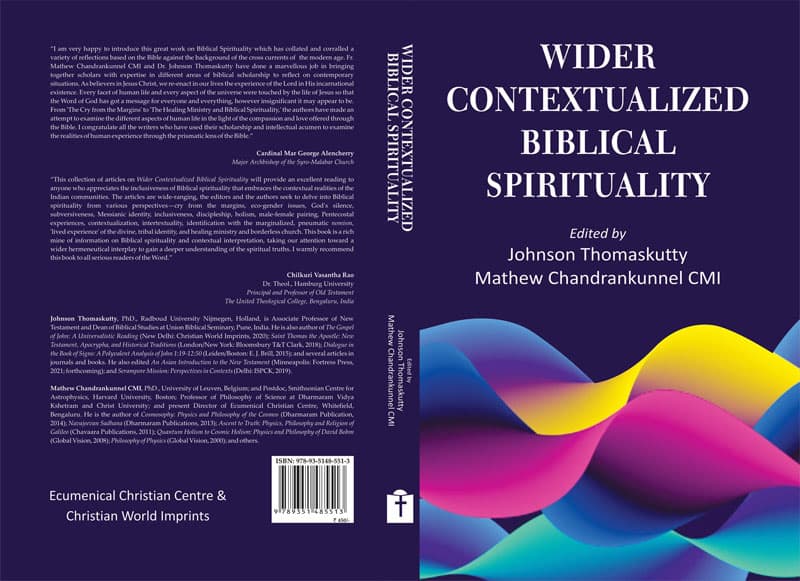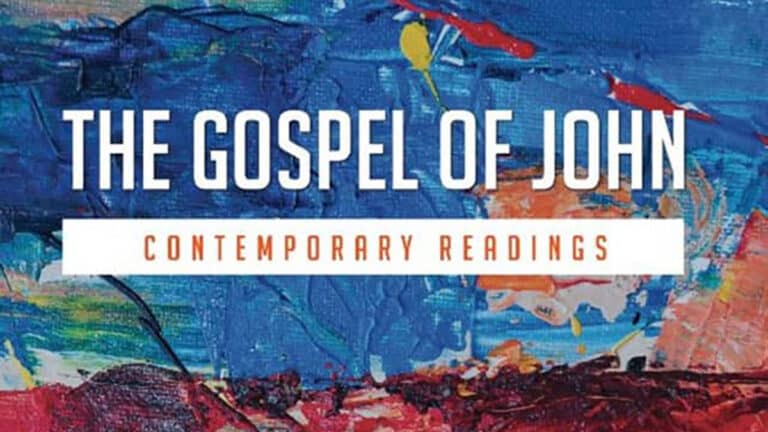New Book: Wider Contextualized Biblical Spirituality

Edited by Johnson Thomaskutty & Mathew Chansdrankunnel CMI
Associate Editors: RSV Sukumar Babu & Thangminlun Vaiphei
A Brief Description of the Book
The current edited volume entitled Wider Contextualized Biblical Spirituality is ecumenical in nature as the authors attempt to interpret the Biblical narratives and the extra-Biblical documents from multiple vantage points and suggest a new way forward for Christian spirituality in the contemporary Indian context. The articles aim to answer the following questions: How can we conceptualize and interpret the Christian Scriptures and extra-Biblical documents for a borderless spiritual formation and orientation? How can the Biblical spirituality cross the human made boundaries like caste, colour, ethnicity, gender, denomination, religion, and others? Can we understand Biblical Spirituality above and beyond the so-called denominational and religious boundaries? How Bible can be used as a paradigm to cross the traditional boundaries, create contextual and ideological constellations, build dialogical relationships, incorporate relevant Indian categories, and rhetorize the discourse toward a ‘Third Space’? Answering these questions are key in the process of searching for a new paradigm of spirituality.
The existent notions of “spirituality” and “biblical interpretations” lag behind in making inclusive and accommodative aspects of the multi-religious, multi-cultural, and pluralistic contexts in India. The prevailing interpretations of biblical spirituality, with their exclusive and parochial tendencies and approaches, do not have the potential to make a wider impact in the contemporary contexts of our country. Often Biblical interpretations introduced to the Indian context are seemingly distanced from the Indian cultural heritage and the message of Christ needed to be incarnated into our ethos imbibing from the wealth of our traditions such as the concept of Guru! Therefore interpreters should employ dynamic and inclusive strategies to interlock the religious scriptures with the spiritual semantics relevant in the Indian contexts. In that process, the Christian Scriptures in closer relationship with other religious traditions of India and the day-to-day lived experiences of the people should be clustered together as kernels to address the pathos of diverse people groups, irrespective of their ethnic, caste-oriented, religious, and gender backgrounds.
In order to achieve this goal, an interpreter of the Bible, first of all, should cross the traditional hermeneutical strategies, moving from exclusive and ecclesiastical interpretations to inclusive and inter-textual and inter-religious interpretations. Creating constellation of ideas between the biblical worldview and the Indian worldview might help interpretations in particular contexts. In a pluralistic context like India, building dialogical engagements with other religious and cultural aspects is both necessary and has the potential to enhance the scope of the interpretative task. Furthermore, through the ways of crossing the traditional boundaries, creating ideological constellations, and building dialogical relationships, the interpreters should aim to direct the Indian mind toward a “third space” that transforms people’s spiritual aspirations and experiences. These are the ways an interpreter can rhetorize her/his interpretative discourse in contexts both “here and now” and “everywhere and ever.” Through all these processes, an interpreter should aim to formulate an inclusive spirituality that transcends all human made boundaries.
The four words used in the title of the book require some attention. The adjective wider can mean either “having great extent or range” or “to the full extent.” The current volume attempts to incorporate some of the varied ideas of the people from different backgrounds with their inclusive outlook and diverse perspectives. The expression contextualized is used with a sense “to place (something, such as a linguistic element or an activity) in a context” or interlocking the contextual realities of the biblical times with that of the Indian ground realities. The term Biblical is inclusive as both the canonical and non-canonical writings are incorporated for ideological convergence and interpretative significance. The noun form spirituality is used here with a broader connotation as it points the reader toward a wider spectrum of human life situations and existent problems. Thus, the title Wider Contextualized Biblical Spirituality is an attempt to interpret and understand the human life situations both in the Biblical thought-world and in the contemporary Indian scenario in cross-pollination and cross-fertilization. The following seventeen articles provide the reader a wider range of understanding of spirituality with a broader outlook.
The seventeen articles in this book deal with a wider contextualized Biblical spirituality that can encompass and accommodate the socio-religious and politico-cultural aspects of the Indian context. In that sense, Biblical spirituality is wider as it is emerged out of people’s varied levels of livelihood and contextualized as it is engaged with the day to day affairs of human surroundings. A crosspollination of the Biblical spirituality that is wider and contextualized with that of the contemporary socio-religious and politico-cultural aspects enables us to understand its inclusive nature. The authors of the articles agree that Biblical spirituality is liberative, transformative, and accommodative as it takes into account a wider spectrum of the human life situations.
Endorsements
“I am very happy to introduce this great work on Biblical Spirituality which has collated and corralled a variety of reflections based on the Bible against the background of the cross currents of the modern age. Fr. Mathew Chandrankunnel CMI and Dr. Johnson Thomaskutty have done a marvellous job in bringing together scholars with expertise in different areas of biblical scholarship to reflect on contemporary situations. As believers in Jesus Christ, we re-enact in our lives the experience of the Lord in His incarnational existence. Every facet of human life and every aspect of the universe were touched by the life of Jesus so that the Word of God has got a message for everyone and everything, however insignificant it may appear to be. From ‘The Cry from the Margins’ to ‘The Healing Ministry and Biblical Spirituality,’ the authors have made an attempt to examine the different aspects of human life in the light of the compassion and love offered through the Bible. I congratulate all the writers who have used their scholarship and intellectual acumen to examine the realities of human experience through the prismatic lens of the Bible.” (Cardinal Mar George Alencherry, Major Archbishop of the Syro-Malabar Church).
“This collection of articles on Wider Contextualized Biblical Spirituality will provide an excellent reading to anyone who appreciates the inclusiveness of Biblical spirituality that embraces the contextual realities of the Indian communities. The articles are wide-ranging, the editors and the authors seek to delve into Biblical spirituality from various perspectives—cry from the margins, eco-gender issues, God’s silence, subversiveness, Messianic identity, inclusiveness, discipleship, holism, male-female pairing, Pentecostal experiences, contextualization, intertextuality, identification with the marginalized, pneumatic nomism, ‘lived experience’ of the divine, tribal identity, and healing ministry and borderless church. This book is a rich mine of information on Biblical spirituality and contextual interpretation, taking our attention toward a wider hermeneutical interplay to gain a deeper and wider understanding of the spiritual truths. I warmly recommend this book to all serious readers of the Word.” (Chilkuri Vasantha Rao,Dr. Theol., Hamburg University, Principal and Professor of Old Testament, The United Theological College, Bengaluru, India).
Table of Contents
- Contributors
- Preface, Mathew Chandrankunnel CMI
- Foreword, Mar George Cardinal Alencherry
- Introduction, Johnson Thomaskutty
- Cry from the Margins as Prayer: A Search for Biblical Spirituality of Prayer – Joy Philip Kakkanattu CMI
- Eco-Gender Spirituality in the Hebrew Bible: Symbiotic Relationship between God, People and Land – Shiju Mathew
- The Spirituality of God’s Silence in Lamentations – Balu Savarikannu
- A Subversive Spirituality of Prophet Jeremiah – Akanksha Samuel Makasare
- The Messianic Spirituality in the Large Isaiah Scroll (1QIsaa) and Its Relevance to the Indian Christian Spirituality – Yeshwanth Bakkavemana
- Matthean Inclusive Spirituality – Laurence Culas
- Spirituality and Discipleship: The Role of Bartimaeus in Mark 10:46-52 – J. Stanly Jones
- Holistic Spirituality in Luke 19:1-10 and Its Response to Poverty in India – Atoholi Swu
- Male-Female Pairing in Luke-Acts: Spirituality of Inclusive Humanism – Prema Vakayil CSST
- Luke-Acts Paradigm and Pentecostal Spirituality – George Philip
- Johannine Spirituality in the Indian/Asian Contexts – Johnson Thomaskutty
- Logos and Dharma: A Spiritual-Hermeneutical Spiritual Analysis of the Fourth Gospel to Proclaim Jesus as Sanatana Sat Guru – Mathew Chandrankunnel CMI
- Identification with the Marginalized: The Pattern of Jesus’ Spirituality – Sajitha Varghese
- Pneumatic Nomism: Law Obedience and the Spirit in Pauline Spirituality – Arren Bennet Lawrence
- ‘Lived Experience’ of the Divine: Towards Understanding Community Spirituality in the Johannine Epistles – Asish Thomas Koshy
- Tribal Spirituality and the New World: The Vocation of the Transformed Identity in the Book of Revelation – Supongmayang Longkumer
- Healing Ministry, Borderless Church and Biblical Spirituality – Arul Dhas T.
- Index of the Ancient Sources
- Index of Authors
Book Details:
Published by: Ecumenical Christian Centre (ECC) and Christian World Imprints (CWI)
Format: Hardcover and Paperback
Pages: 302
Year of Publication: 2021
ISBN: 978-93-5148-550-6 (HB); 978-93-5148-551-3 (PB)
Order now: [email protected]

